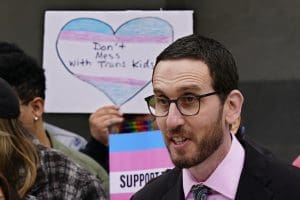These states are taking steps to protect LGBTQ people's rights and safety
More lawmakers are introducing and passing legislation to protect LGBTQ people in their jurisdictions from the discriminatory laws of other states.

As bills targeting the rights of LGBTQ people are enacted in many states, several states stand out from the rest for taking action to protect LGBTQ residents from discrimination.
Republican state lawmakers and governors have enacted at least 19 pieces of anti-LGBTQ legislation this year prohibiting transgender kids from playing on the team of their gender; censoring classroom discussions of LGBTQ topics; banning all or some kinds of gender-affirming health care for trans kids; and stopping state governments from taking action against adoption and foster care providers who reject applicants on the basis of religion, to name a few.
The legislation enacted this year continues ramped-up anti-trans efforts by GOP policymakers over the past few years fueled by national right-wing groups including the Heritage Foundation, the Family Policy Alliance, and the Alliance Defending Freedom.
Young transgender people say that the onslaught of new state laws targeting them has taken a toll on their mental health as they watch lawmakers engage in the same sort of demeaning and discriminatory rhetoric they’ve faced in person from their peers. Charlie Apple, an 18-year-old from Texas, told Kaiser Health News in February, “Seeing these people who are supposed to protect you, who are supposed to make laws to protect children, say all these horrible things and make it clear that you are not worth fighting for? That’s a whole different thing.”
A number of states, however, have taken positive steps to protect LGBTQ people.
Washington state and Vermont have enacted bills to to protect prisoners’ rights to privacy and to make it easier for transgender and nonbinary people to change the gender marker on their birth certificates.
H.B. 1956, sponsored by Washington Democratic state Rep. David Hackney and signed into law by Democratic Gov. Jay Inslee with effect on March 31, provides exemptions for the release of prisoner records related to “medical, mental health, or dental diagnoses or conditions” as well as genital anatomy, sexual orientation, and a prisoner’s transgender or nonbinary status. Hackney told the American Independent Foundation in February that the law would prevent anti-LGBTQ groups from obtaining such information.
On April 6, Vermont Republican Gov. Phil Scott went against the tide of anti-trans vitriol his party has largely embraced this year and signed into law H. 628, a bill that simplifies the process for Vermonters who want to change the gender marker on their birth certificates. The law will take effect on July 1.
Scott said in a statement on Twitter: “Working to make our state more welcoming and inclusive for all must be a priority, and this is another important step towards that goal. I want to thank the legislators, advocates, and members of my Administration for working together to advance this bipartisan initiative and I’m happy to sign it into law.”
The bill was originally introduced by Vermont state Rep. Taylor Small, who was elected to office with the nominations of both the Progressive Party of Vermont and the Democratic Party in 2020 and is the state’s first openly transgender lawmaker. “The meaning of this bill is so much greater than just thinking about birth certificates. It’s a symbol of all of the obstacles that trans people, and in particular trans youth, go through just to see themselves validated,” Taylor said in April, according to the website VTDigger. The law states:
There is a long history of discrimination and violence against the LGBTQIA+ community. This act serves to mitigate future harm through the creation of a simple and equitable system to provide for all gender marker changes on a Vermont birth certificate to be made through means such as self-attestation. … It is the policy of the State of Vermont to honor and acknowledge all gender identities and protect public health and dignity of all individuals in Vermont, irrespective of their gender. Accordingly, the State shall adopt a simple process by which an individual may amend the marker on a birth certificate to reflect the individual’s gender identity, including a third non-binary marker.
The law also makes all records associated with changing birth certificates confidential.
The Colorado Legislature in April passed H.B. 22-1153, a bill that would change the process for “affirming parentage by adoption,” making it simpler and more accessible both for many LGBTQ people and non-LGBTQ people who use assisted reproductive technology. Colorado Democratic House Majority Leader Daneya Esgar, one of the sponsors of the bill, had given birth to a child with her wife, Heather Palm, using Palm’s genetic material, and had been shocked to discover that Palm would have to adopt her own biological child, according to the website Colorado Newsline.
The bill removes certain barriers to acknowledgment of parental rights, such as fingerprinting parents and making them go through a criminal offender record search, and it replaces references to a “father” or “mother” in current court rules, government policies, and administrative rules with the word “parent.” The legislation was sent to Colorado Democratic Gov. Jared Polis for signature on May 9.
New York, California, and Minnesota have introduced legislation to protect families that have left states with laws that threaten their transgender children. Such “trans refuge” bills would prohibit the separation of a child from their parent based on laws in other states that criminalize gender-affirming health care for minors. In the words of New York’s bill, S. 8842:
A law of another state that authorizes a child to be removed from their parent or guardian based on the parent or guardian allowing their child to receive gender affirming care shall not be enforced or admissible with regard to a child present in this state. … No state or local law enforcement agency shall cooperate with or provide information to any individual or out-of-state agency or department regarding the provision of lawful gender affirming care performed in this state.
Minnesota state Sen. Scott Dibble of the Democratic-Farmer-Labor Party said in a statement about the bill he introduced, S.F. 4525, “Far-right politicians across the country are playing games with people’s lives by criminalizing the fundamental right of Transgender youth and their families to seek gender-affirming health care. While we cannot stop these despicable laws from being enacted in other states, we can make sure that these youth and their families can safely receive the care they need in Minnesota, without fear or hatred.”
On May 3, LGBTQ lawmakers in 16 more states — Colorado, Connecticut, Florida, Georgia, Illinois, Kansas, Kentucky, Maine, Michigan, New Hampshire, New Mexico, Oregon, Rhode Island, Vermont, Washington, and West Virginia — announced plans to introduce similar bills. The legislation will be modeled after S.B. 107, a trans refuge bill introduced by California Democratic state Sen. Scott Wiener that says another state’s laws providing for civil or criminal action against people or entities that offer gender-affirming care may not be enforced in California courts. The bill specifies:
This bill would declare another state’s law authorizing a civil or criminal action against a person or entity that allows a child to receive gender-affirming health care to be contrary to the public policy of this state. … The bill would prohibit a provider of health care, a health care service plan, or a contractor from releasing medical information related to a person or entity allowing a child to receive gender-affirming care in response to a criminal or civil action … based on another state’s law.
“Parents should not live in fear of being hunted down by the government for loving and supporting their child,” said Tony Hoang, executive director of Equality California.
Democratic California Gov. Gavin Newsom in September 2021 signed into law A.B. 1094, introduced by Democratic state Assembly Member Joaquin Arambula, to provide for a three-year pilot program in six counties to improve the collection of data about the violent deaths of LGBTQ people. The California Department of Public Health told the American Independent Foundation that it “anticipates starting this pilot program later this year.”
The law requires the department to train coroners and medical examiners in the collection of data on sexual orientation and gender identity in violent deaths, such as homicides and suicides.
Samuel Garrett-Pate, communications director for Equality California, an advocacy group that supported the program, told the Guardian in September 2021, “We know that LGBTQ people are more often the victims of violent crimes. Within the LGBTQ community because of lack of acceptance, discrimination and harassment, we see higher rates of suicidal ideation. We only know how best to address these important issues when we have the data.”
The District of Columbia is also considering safeguards. On May 6, a district council member, Democrat Brianne Nadeau, a member of the Council of the District of Columbia, proposed B. 24-808, a bill that would provide protections against actions by other states to investigate abortions performed in the district and criminalizing the act of providing, obtaining, or facilitating gender-affirming care. Connecticut passed a similar bill on April 29.
Many states’ legislative sessions have already ended, and lawmakers will have to revisit these bills next year. California, New York, and Kansas still have time left in their current legislative sessions.
Published with permission of The American Independent Foundation.
Recommended

Alaska House committee advances, expands proposal to bar trans girls from girls sports
Amended bill would add elementary, middle school and collegiate sports to limits in place for high school
By Claire Stremple, Alaska Beacon - April 16, 2024
Bills targeting trans people are on the rise nationwide and in Alaska — most focus on children
House committee advances legislation that would restrict the rights of Alaska trans kids
By Claire Stremple, Alaska Beacon - April 01, 2024
Anti-abortion, anti-LGBTQ resolutions to be voted on at state Republican convention
A resolution to be considered by North Dakota Republican Party delegates at their upcoming convention would define life as beginning at fertilization and call for criminal penalties for “anyone who kills a pre-born human being.”
By Michael Achterling, North Dakota Monitor - March 26, 2024










































































